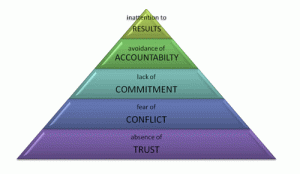By Rose O. Sherman, EdD, RN, FAAN
“Most successful people learn to be competitive with their peers, and protective of their reputations. It is a challenge for them to turn those instincts off for the good of team, but that is exactly what is required”. Patrick Lencioni
I recently met with a nurse leader who told me about her frustration being part of a leadership team that was dysfunctional. Our team is failing to work constructively together, she reported. It is frustrating to many of us, but I am not quite sure whether this dynamic can be changed. In today’s health care environment, much of our work is team-based. Not all teams work together well. Assessing why teams fail and how to improve teamwork is a key nursing leadership skill.
In 2002, Patrick Lencioni wrote a business bestseller on the Five Dysfunctions of a Team. He notes that genuine teamwork is elusive in most organizations yet lack of teamwork is a primary reason why initiatives fail. He provides an overview of the following five common dysfunctions seen on teams and offers suggestions for overcoming these problems:
1. An Absence of Trust
When team members don’t trust one another, they conceal their weaknesses and mistakes. There is less willingness to ask for help or provide constructive feedback. There is a failure to tap into the expertise of others and too much time is spent on managing appearances. It is only when team members are truly comfortable with each other that they spend less time protecting themselves. Trust can be difficult to build in a dysfunctional team but some specific suggestions include: 1) sharing personal histories 2) doing -personality tools such as the Myers-Briggs to build understanding 3) experiential exercises such as a ropes course 4) having each team member identify the single most important contribution that each of their peers make to the team. The team leader must be actively engaged in the process for trust to be rebuilt and this involvement must be genuine.
2. Fear of Conflict
When there is a fear of conflict on teams, crucial conversations don’t happen. Environments are created where there is a lack of transparency in how problems are managed and personal attacks thrive. Controversial topics critical to team success are ignored. The opinions and perspectives of all team members are not considered. To overcome a fear of conflict, team members must believe that conflict can be productive. Points of conflict need to be called out — look for the elephants in the room. The team needs to believe that it is okay to agree to disagree. The team leader needs to practice restraint and let conflicts occur without getting prematurely involved.
3. Lack of Commitment
When teams fail to commit to a strategic direction or completion of a goal, there is ambiguity about team direction and priorities. Windows of opportunity can close because of excessive analysis or unnecessary delays. On a team that fails to commit, decisions are revisited again and again. This breeds a lack of confidence and a lack of a sense of accomplishment. Team members second guess every goal or decision. To turn around a lack of commitment, teams need to make clear and timely decisions. Every team member needs to buy into a decision, even those who voted against it. Deadlines need to be established to reach commitment and there needs to be recognition that there is no absolute certainty on any decision. Complete consensus will not always be possible. The team leader must be willing to push the team for closure and make decisions, even if they do turn out to be mistakes.
4. Avoidance of Accountability
When there is no accountability on teams, there is resentment among members about different standards of performance. Deadlines and key deliverables are missed. Performance measures are not achieved. There is an atmosphere of mediocrity. To avoid a lack of accountability, team members must be willing to call out their peers on behaviors that might hurt the team. Standards need to be clear, published and adhered to by all team members. The reward system should reinforce team accountability. The team leader must be willing to allow team members to hold one another accountable.
5. Inattention to Results
When a team is not results oriented, they will lose high performing, achievement oriented members. Team members begin to focus on their own careers and goals. The team fails to grow. When teams commit publicly to specific results, they are more likely to work passionately to achieve their goals. The reward system should reinforce team achievement. The team leader must be willing to set a tone that focuses on results.
Lencioni observes in his book that these principles sound simple because in theory, they are. In practice ,however, changing team behaviors can be extremely difficult because it requires discipline and persistence. Turning around a team that is failing requires strong leadership and team commitment. But when you consider the high costs of team failure, particularly in health care, it is a small price to pay.
Read to Lead
Lencoioni, P. (2002). The Five Dysfunctions of a Team. San Francisco: Jossey-Bass Publishers
© emergingrnleader.com 2012



 LinkedIn
LinkedIn Instagram
Instagram